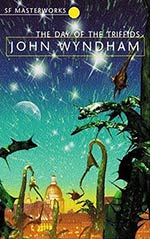
![]() Darling
Darling
9/13/2011
![]()
I've never seen the whole movie, so I can't compare. I must say, though, that this book is a beautiful statement on WMDs. In a day when nuclear technology was still young, this book (as well as his shortstory "Re-birth") speaks of a hope that comes from the sky. In both cases, a newer, wiser humanity emerges from the apocalypse and retains flight (itself a newish technology in the 1950s) offering hope to those who struggle in the morass. In both cases love and children are the powerful binding and driving forces of the story. Wyndham could not have directly foreseen the potential dangers posed by genetically engineered plants that may present problems for those who use them as food sources. However, the triffids are a viable harbinger of the current issue.
The story itself is an odyssey of sorts, travelling in and out of London, across the country-side and into other towns, bringing Bill from a world of tradition-bound mediocrity, to a freer, more scientifically guided world. The European attitudes concerning religion are so far removed from American mores of the day, and even of today, that it forms a point of tension, but never a serious objection to the new shuffle of the deck. Old style evangelical fervor dies out quickly, condemned by impractical approaches to a life that demands a new take on things.
Bill's dual focus on survival in the face of the triffids and maintaining a connection with Josella make him a likeable and interesting character. However, The Day of the Triffids loses some of its potential for greatness in the relative static nature of Bill's character. From the beginning he sees the triffids as a problem when few others do. He undergoes some minor shifts when he and Josella discuss the possiblity of polygamous marriage. However, his most profound shift takes place when he realizes that the mode of life is not as important to him as with whom he spends it. Love indeed conquers all. His love for Josella trumps and informs any decisions he may wish to make concerning his sociological leanings. This is an important, but not a startling shift for him.
Perhaps though, this kind of shift is most important. Bill ultimately, with the help of others (an important theme in the book) overcomes the "natural" threat of the triffids. More importantly, he settles on his relationships with other people as being central and vital to his well being. Man is gregarious. To cultivate that gregariousness is more important than to win over other people. Survival will depend on cooperation, not competition.